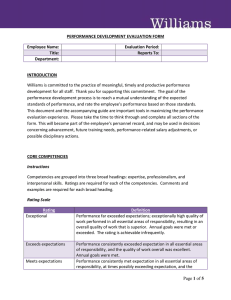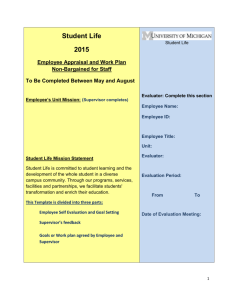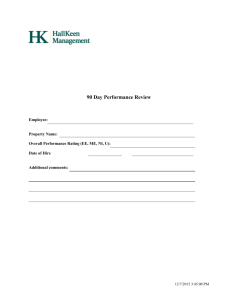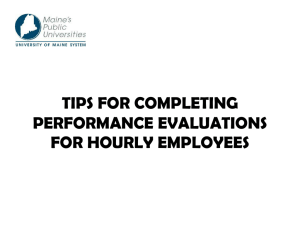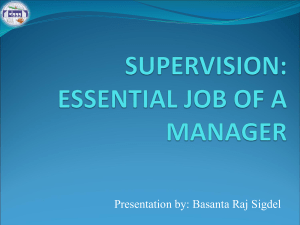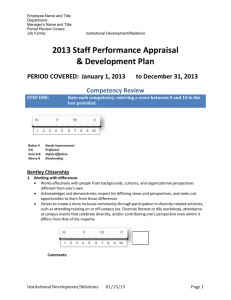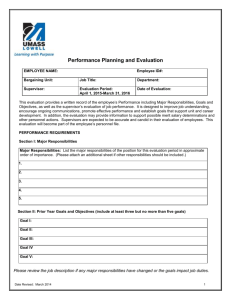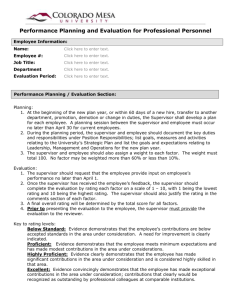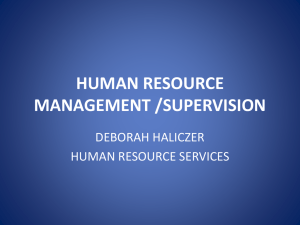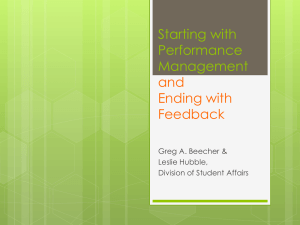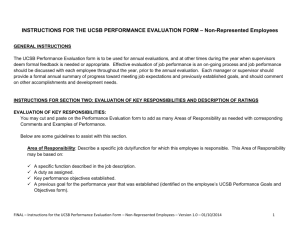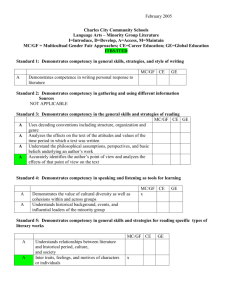Performance management program, instructions and definitions
advertisement
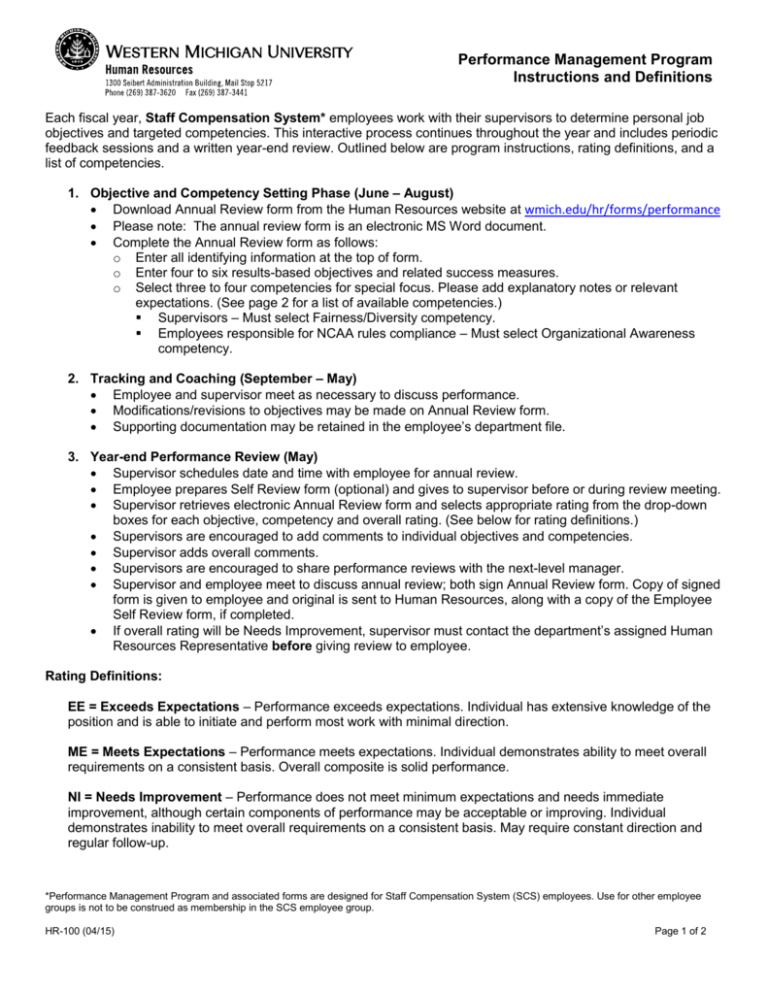
Performance Management Program Instructions and Definitions Each fiscal year, Staff Compensation System* employees work with their supervisors to determine personal job objectives and targeted competencies. This interactive process continues throughout the year and includes periodic feedback sessions and a written year-end review. Outlined below are program instructions, rating definitions, and a list of competencies. 1. Objective and Competency Setting Phase (June – August) Download Annual Review form from the Human Resources website at wmich.edu/hr/forms/performance Please note: The annual review form is an electronic MS Word document. Complete the Annual Review form as follows: o Enter all identifying information at the top of form. o Enter four to six results-based objectives and related success measures. o Select three to four competencies for special focus. Please add explanatory notes or relevant expectations. (See page 2 for a list of available competencies.) Supervisors – Must select Fairness/Diversity competency. Employees responsible for NCAA rules compliance – Must select Organizational Awareness competency. 2. Tracking and Coaching (September – May) Employee and supervisor meet as necessary to discuss performance. Modifications/revisions to objectives may be made on Annual Review form. Supporting documentation may be retained in the employee’s department file. 3. Year-end Performance Review (May) Supervisor schedules date and time with employee for annual review. Employee prepares Self Review form (optional) and gives to supervisor before or during review meeting. Supervisor retrieves electronic Annual Review form and selects appropriate rating from the drop-down boxes for each objective, competency and overall rating. (See below for rating definitions.) Supervisors are encouraged to add comments to individual objectives and competencies. Supervisor adds overall comments. Supervisors are encouraged to share performance reviews with the next-level manager. Supervisor and employee meet to discuss annual review; both sign Annual Review form. Copy of signed form is given to employee and original is sent to Human Resources, along with a copy of the Employee Self Review form, if completed. If overall rating will be Needs Improvement, supervisor must contact the department’s assigned Human Resources Representative before giving review to employee. Rating Definitions: EE = Exceeds Expectations – Performance exceeds expectations. Individual has extensive knowledge of the position and is able to initiate and perform most work with minimal direction. ME = Meets Expectations – Performance meets expectations. Individual demonstrates ability to meet overall requirements on a consistent basis. Overall composite is solid performance. NI = Needs Improvement – Performance does not meet minimum expectations and needs immediate improvement, although certain components of performance may be acceptable or improving. Individual demonstrates inability to meet overall requirements on a consistent basis. May require constant direction and regular follow-up. *Performance Management Program and associated forms are designed for Staff Compensation System (SCS) employees. Use for other employee groups is not to be construed as membership in the SCS employee group. HR-100 (04/15) Page 1 of 2 Competency Categories: Organizational Success Customer Services – Offers assistance proactively. Ensures requests have timely and complete responses. Commits and follows-through to find an answer when one is not immediately known. Asks appropriate questions so that the best response is more readily found. Encourages customer feedback. Supports a diverse group of customers with varying needs and approaches. Leadership – Models expected behaviors. Builds relationships both inside and outside of the organization that benefit WMU. Inspires and leads others. Establishes and helps others understand the direction of the University, department or area. Process Improvement/Innovation – Finds more effective approaches to completing assignments. Tries new methods to address issues and improve processes. Constructively seeks alternatives to traditional thinking. Takes reasonable risks and learns from mistakes. Teamwork – Is open to others’ ideas. Supports team decisions. Considers others’ unique strengths and diverse views and opinions. Participates actively on teams; offers opinions constructively. Demonstrates awareness of others’ objectives and responsibilities. Helps wherever needed. Job Effectiveness Communication – Exercises solid listening, written and oral communication skills. Communicates in a concise manner. Interacts effectively at all levels of the organization. Modifies communication style to suit situation and audience. Decision Making – Weighs knowledge of policies, departmental needs, and common sense in making decisions. Builds consensus when appropriate. Proposes solutions that are good for the whole (University, department, group, etc.) while demonstrating sensitivity to individual needs. Delegates work effectively. Organizational Awareness – Demonstrates knowledge of the University’s mission and objectives. Stays current on University events and issues. Understands and adheres to current University policies. Values and appreciates differences of faculty, staff and students. Problem Solving – Solves problems by identifying, collecting and analyzing relevant data. Finds ways to achieve desired results despite obstacles. Is able to determine when a problem can be solved without further involvement and when a solution will require others’ input. Technical Skills – Demonstrates working level of skill/knowledge in area of expertise. Applies professional and technical expertise to best meet department/area needs. Stays current on new tools and techniques in area of expertise. Making People Matter Effective Feedback and Development – Acknowledges accomplishments broadly. Provides constructive feedback and shares responsibility for failures. Is available to direct reports and coaches them using effective communication skills. Works with direct reports to identify development opportunities. Teaches skills or identifies resources for skill development. Encourages giving and receiving feedback. Fairness/Diversity – Applies standards consistently and objectively. Maintains confidentiality. Complies with the University’s non-discrimination policy. Is reasonable and fair when assigning work. HR-100 (04/15) Page 2 of 2
